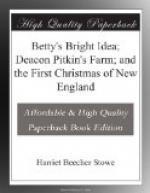“That day, so soon as we could, we set ashore some fifteen or sixteen men well armed, with some to fetch wood, for we had none left; as also to see what the land was and what inhabitants they could meet with. They found it to be a small neck of land on this side where we lay in the bay, and on the further side the sea, the ground or earth, sand-hills, much like the downs in Holland, but much better; the crust of the earth a spit’s depth of excellent black earth; all wooded with oaks, pines, sassafras, juniper, birch, holly, vines, some ash and walnut; the wood for the most part open and without underwood, fit either to walk or to ride in. At night our people returned and found not any people or inhabitants, and laded their boat with juniper, which smelled very sweet and strong, and of which we burned for the most part while we were there.”
“See there,” said little Love Winslow, “what fine red berries Captain Miles Standish hath brought.”
“Yea, my little maid, there is a brave lot of holly berries for thee to dress the cabin withal. We shall not want for Christmas greens here, though the houses and churches are yet to come.”
“Yea, Brother Miles,” said Elder Brewster, “the trees of the Lord are full of sap in this land, even the cedars of Lebanon, which he hath planted. It hath the look to me of a land which the Lord our God hath blessed.”
“There is a most excellent depth of black, rich earth,” said Carver, “and a great tangle of grapevines, whereon the leaves in many places yet hung, and we picked up stores of walnuts under a tree—not so big as our English ones—but sweet and well-flavored.”
“Know ye, brethren, what in this land smelleth sweetest to me?” said Elder Brewster. “It is the smell of liberty. The soil is free—no man hath claim thereon. In Old England a poor man may starve right on his mother’s bosom; there may be stores of fish in the river, and bird and fowl flying, and deer running by, and yet though a man’s children be crying for bread, an’ he catch a fish or snare a bird, he shall be snatched up and hanged. This is a sore evil in Old England; but we will make a country here for the poor to dwell in, where the wild fruits and fish and fowl shall be the inheritance of whosoever will have them; and every man shall have his portion of our good mother earth, with no lords and no bishops to harry and distrain, and worry with taxes and tythes.”
“Amen, brother!” said Miles Standish, “and thereto I give my best endeavors with sword and buckler.”
CHAPTER III.
CHRISTMAS TIDE IN PLYMOUTH HARBOR.
For the rest of that month of November the Mayflower lay at anchor in Cape Cod harbor, and formed a floating home for the women and children, while the men were out exploring the country, with a careful and steady shrewdness and good sense, to determine where should be the site of the future colony. The record of their adventures is given in their journals with that sweet homeliness of phrase which hangs about the Old English of that period like the smell of rosemary in an ancient cabinet.




